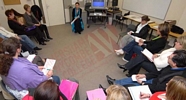REVIEW OF LITERATURE
It is often assumed that when players on a team display unity and stick together, they will have a greater chance of team success. Unfortunately, this intuitively appealing assumption is not a straight forward as it may appear. This chapter will focus upon cohesion within groups, defining cohesion, the measurement of cohesion, the history of cohesion research and will then progress onto information regarding this investigation
Group Social Settings
Cohesion is an important aspect within group social settings with membership and involvement in groups being an all-encompassing characteristic of our society. "We enter life as a member of society's strongest group – the family. As we go through life the majority of things that we do are done in groups. We go to school in groups, we go to work in groups, and we worship and also participate in sport in groups" (Carron et al, 1998b).
Within group settings, people influence the behaviours, attitudes and cognitions of other people, and in turn we are influenced. Cohesion is one aspect of a group that can be affected and is dependent upon its members. "Some social scientists have called cohesion the most important small-group variable"
(Lott & Lott, 1965, Cited in Paskevich et al, 2001, p.477)
A group of individuals does not necessarily form a team. Becoming a team is an evolutionary process, with constant development and changes in attempts to respond to internal and external factors. It is important that people can determine between groups and teams as this study investigates the cohesion-performance relationship of a university soccer team.
The majority of team/groups go through a developmental sequence to move from a mere collection of individuals to a team (Tuckman, 1965, Cited in Carron et al, 1998b). The table below illustrates the stages of development that occur for a team over a season
Table 1: The stages of development that occur for a team over a season long time perio
Stage 1
Orientation: Cohesion and feelings of unity are high; the athletes share many common feelings, anxieties and aspirations.
Stage 2
Differentiation and Conflict: The group physically or psychologically subdivides into smaller units; conflict often arises as athletes compete for positions on the team.
Stage 3
Resolution and Cohesion: Cohesion increases as group members share common concerns and feelings as they prepare to face a common threat.
Stage 4
Differentiation and Conflict: Team unity is weakened as different individuals are rewarded or punished, setting them off from the group.
Stage 5
Termination: If the season has been successful, feelings of cohesion are high. If the season has been unsuccessful, feelings of cohesion are low.
Carron et al, (1998b), p.119



